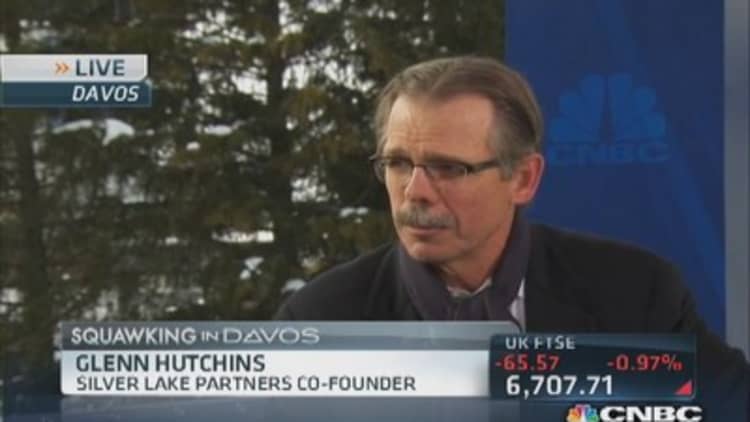It is very easy not to like Davos.
This week a couple thousand of the world's Very Important People convened once again at the annual meeting of the World Economic Forum in Davos. The invite-event, protected by razor wire barricades and rooftop snipers, is the premiere gathering for elite businessmen and women, political leaders, journalists, well-known academics and international bureaucrats.
It takes place in a resort town in Switzerland. Think Aspen, Colo., but with far less charm. The meeting is rigidly hierarchical, with different-colored badges for different types of attendees permitting access to different types of events, like an exclusive nightclub with VIP areas inside of VIP areas inside of VIP areas.
And, actually, that's literally true of the parties that take place at night after the official meetings. It's like an onion that stinks more and more of wealth, power, envy and status-climbing with each layer you peel back.
So you can see why anyone with populist, libertarian or leftist blood coursing through one's arteries would bristle when hearing about Davos. It's obviously elitist, annoying the pitchfork types. It puts heads of state at the top of the pecking order, as Reuters' Felix Salmon recently explained, raising alarms for free marketeers.
The agenda is focused around the hobbyhorses of people who manage the greatest concentrations of wealth the world has ever seen, unsettling the socialists. If it doesn't make you want to throw up the black flag of anarchy, well, you were probably invited to Davos.
Well, I write not to assuage your urge to rise up against Davos. After you're done reading this, I hope you will have no better of an opinion of Davos than you already do. But if we are going to hate Davos, let's hate it for the right reasons.

Many of the objections to Davos proceed from the cynical theory that it is really all about self-interest. Despite all of the progressive rhetoric and purported pursuit of world improvement, what's really going on in Davos is just disguised class politics, cynics of both the right and left argue.
The global elite address the pressing issues of the day in order to either allay their conscience or assure that the "issues" are resolved in ways that do not disturb their status as elites. Business leaders go to ingratiate themselves with political leaders and vice versa. Elites of the world unite.
An equally cynical theory is that Davos is really not about anything other than Davos. It exists because it exists, and draws in the elite because it has a critical mass of elite gravity. It's an elitist black hole.
Salmon, who has been to Davos more than any other person I know personally, writes that people come to Davos "because they are invited; because they can get their companies to pay for it; because it's generally considered a hot ticket that lots of people want; and because they get to rub shoulders with heads of state and global celebrities."
One of the advantages of Salmon's alternative cynicism is that it provides a unique angle for writing that makes his pieces from Davos so terrific to read. Salmon aims his pieces at undercutting the elite status of those at Davos, criticizing them for being insufficiently elitist. They drink wine wrong; they don't vigorously enough support gay rights; and so on.
The basic idea is that Salmon is writing down to them, stirring up all their fears that they actually really are inadequate to the ambitions of Davos.
But as entertaining as this can be, it isn't really a fully accurate portrait of Davos. And neither is the class politics view. If you could peer into the hearts of many of the grandees there, you would find a genuine interest in world improvement.
And while it is true one of the reasons this genuine interest exists is because being interested in "global issues" is one of the ways you display your status as a member of the global elite, that doesn't mean it's not truly felt. The Davos urge to improve is a signaling device but it's not a false flag.
(Read more: Nassim Taleb and the Ghost of Davos)
What's wrong with Davos is not just disguised self-interest or status-seeking decadence. It's something deeper, something at the very heart of the enterprise. Even if we completely shed our cynicism about Davos, we'd still find it irredeemably flawed. And that's because even in its most idealized form Davos is built around a mistake.
The easiest way to see that mistake is through the words of Andrew Ross Sorkin. His column this week was an investigation into why some of the sort of people who some think should be at Davos refuse to attend. It was also a lament over this absence because the absence interferes with the work of the Davos luminaries.
"The progress they make—or try to make—may be praiseworthy. But at a time when globalization has so transformed business and economics, and at an event that bills itself as drawing the top stakeholders, it easy to understand why it is so difficult to make progress on the big issues when so many key people are not in the room," Sorkin writes.
The not quite explicit premise here is that "progress on the big issues" is something that occurs as the outcome of the efforts of "key people," which is to say the "bold-faced names" who get invited to Davos. This is the basic assumption of Davos—and it is completely without grounding in reality.
This confidence in the ability of people who have been successful in business, politics or global bureaucracies to bring about a better world is unwarranted. It appears to be based on a kind of cult of success, a notion that rising to the top of the global hierarchies of power and wealth implies a kind of expertise about worldly matters.
The effectiveness of the folks at Davos is not even really up for question. So the purpose of Davos is to marshal that effectiveness into making progress on big issues.
The truth is that there's no evidence to support this presumption of effectiveness. To put it even more strongly, it's a pretty good bet that this kind of expertise and therefore effectiveness is a kind of social illusion because the kind of knowledge that would be needed to sustain it just doesn't exist.
No one has the kind of power the folks at Davos think they do because no one has the kind of knowledge that would be required to wield that kind of power.
(Read more: The miseries of a Davos wife)
That's why some of the more paranoid attacks against Davos are wrong, by the way. The Davos crowd does not control the world, as some would have it. They don't even control the small parts of the world they imagine they do.
Business leaders don't really control their corporations and heads of state don't control their states. The touted organizational skills and expertise of Davos Man produce the desired effects so unpredictably and unsystematically that it's safe to say they are just coincidental.
What we mistake for success is closer to a priest praying for rain just before a storm hits.
The usual rejoinder to this is that if the successful were so powerless and ignorant they couldn't possibly be so successful. How could, say, Brady Dougan, the head of Credit Suisse, be as wealthy and as powerful as he is in a meritocratic system if he weren't imbued with the powers and habits that we associate with "highly effective people"?
Doesn't success in a capitalist and Democratic system at least imply some higher level of brilliance, foresight or competence? Or, to put it differently, if our system wasn't geared toward rewarding brilliance and foresight, how could we explain the prosperity that so much of the world has unquestionably experienced over the last hundred years?
The answer is quite simple: that's not how markets work. Our prosperity is not, fortunately, dependent on brilliance, foresight, honesty or vision. It is the result of market processes that allow enterprises that best deliver satisfaction to thrive and punish those that fail at this with bankruptcy or liquidation.
There is, of course, no way of telling in advance which enterprises will thrive and which will fail—if there were, no one would invest their time or efforts in the enterprises doomed to fail.
There's a radical implication arising from this view of the power and necessity of market processes. If market processes are necessary there is no reason to suppose that those managing the successful business are especially gifted. Even if they had a well-articulated idea about why they would succeed, there's no guarantee that this idea is actually what made them succeed.
Indeed, markets operate so well because they do not depend on anyone being particularly well-informed or insightful. No one has to arrive at the correct view of why a capitalist enterprise is succeeding for it to succeed. So all we know from the success of the folks at Davos is that they were successful.
In other words, and at risk of sounding like a deservedly despised social Darwinist, market success is much like evolutionary success. The surviving species don't have to know why they're better adapted; in fact, almost none of them do. Even in hindsight, it's far from clear why it was a good idea for humans to be so very nearly hairless. All we know is that it seems to have worked.
If the situation were otherwise, market processes would be necessary only in the early stages of each generation's development. We could employ markets to initially sort out the gifted and then appoint them to government planning commissions that would allocate societal resources.
As the scholar Jeffrey Friedman pointed out in an essay entitled "There is No Substitute for Profit and Loss," that actually was what was behind the attempts in the 1930s to create a kind of market socialist system. The attempts floundered on the fact that absent market processes, even the allegedly gifted capitalists could not evaluate the effectiveness of their resource allocations.
The underlying idea at Davos is a kind of updated version of this. It lionizes the effectiveness of the successful and presumes that this success can be transferred out of the immediate context in which it occurred. But if this were true, investors would know that past performance would be a guarantee of future results.
Much the same argument can be applied to politics and nongovernmental organizations. They suffer from the same lack of expertise and effectiveness as businessmen—only more so. We lionize the successful but this is almost purely survivor bias, reading merit and effectiveness into outcomes we applaud. Might as well kill the goat to end the drought.
We all remember the story of the emperor with no clothes. Davos isn't that. They've got very fine clothes in Davos. They just aren't effective emperors (or, perhaps, emperors of effectiveness).
This doesn't mean that their decisions do not matter or that we should not concern ourselves with what they are doing. Quite the opposite. They do indeed exercise economic and political influence that can very much effect the lives of a great many people on the planet. They just cannot do the very thing they think is their particular gift, which is understand the world well enough to devise the effective means for its improvement (except, perhaps, by accident).
The worst thing about Davos isn't really the obvious coziness of wealth, influence and state authority. It's that they're so wrapped up in the mythology that lionizes their personal qualities as "thought leaders" that they've mistaken being the primary beneficiaries of global prosperity and government stability with being the sources of these great accomplishments of humanity.
—By CNBC's John Carney. Follow him on Twitter @Carney






